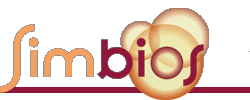Simbios' Molecular Dynamics (MD) Simulation and Analysis Workshop is intended for those interested in:
- Accelerating MD simulations on GPUs
- Having a framework for quickly developing and implementing new MD algorithms
- Discovering new tools to enhance your MD simulations and the analysis of them
No programming background is required, though programming topics will also be covered for those who are interested in them.
Description
During the workshop, you will gain hands-on experience with and learn to use several powerful tools, including:
- PDBFixer
Enabling easy preparation of PDB files for MD simulations
Learn more...
During the workshop, you will:
- Learn to generate a PDB file suitable for molecular dynamic simulations
- Explore different ways PDBFixer can be integrated into your workflow
- OpenMM
Open-source software for rapid molecular dynamics simulations on GPUs and CPUs
Learn more...
During the workshop, you will learn to:
-
Set up and run an MD simulation using PDB, AMBER, and GROMACS files
- Use OpenMM's unique prototyping capabilities and create a custom force to apply to your simulation
- Customize simulations through Python scripting
- Specify the platform (CPU or GPU) to use for your simulation
For specific performance details, see the OpenMM benchmarks.
- MSMBuilder
Trajectory analysis tool based upon Markov State Models
Learn more...
During the workshop, you will:
- Learn different techniques for analyzing MD simulations, including Markov State Models and why they are suitable for this
- Gain hands-on experience with the MSMBuilder software to automatically construct Markov State Models for trajectory analysis
- MDTraj
Trajectory analysis and manipulation tool
Learn more...
During the workshop, you will:
- Learn about the many features available in MDTraj, including fast RMSD and solvent accessible surface area calculations
- Gain hands-on experience using MDTraj for common analyses
You will also have an opportunity to apply these tools to your own research problems.
Schedule
The two-day workshop will be held
March 31 - April 1, 2014.
The agenda will be determined by participants' interests and backgrounds.
A sample agenda is available
here.
Workshop Logistics
The workshop will be held at Stanford University and is free to attend. However, registration is required and spaces are limited.
Preparing for the Workshops
For the workshop, attendees are expected to bring their own laptops with the necessary software already installed. Detailed instructions will be sent to participants before the workshops.
Additional details (including directions, travel, & lodging info).
[1] OpenMM accelerated code running on NVIDIA GeForce GTX 280 GPU vs. conventional code with Amber9 running on Intel Xenon 2.66 GHz CPU. MS Friedrichs, et al., "Accelerating Molecular Dynamic Simulation on Graphics Processing Units," J. Comp. Chem., 2009, 30(6):864-872.
[2]Eastman, P. and Pande, V.S. (2009). Efficient Nonbonded Interactions for Molecular Dynamics on a Graphics Processing Unit. Journal of Computational Chemistry. (In press)
[3] GR Bowman, X Huang, and VS Pande, "Using generalized ensemble simulations and Markov state models to identify conformational states," Methods, 49(2):197-201.



